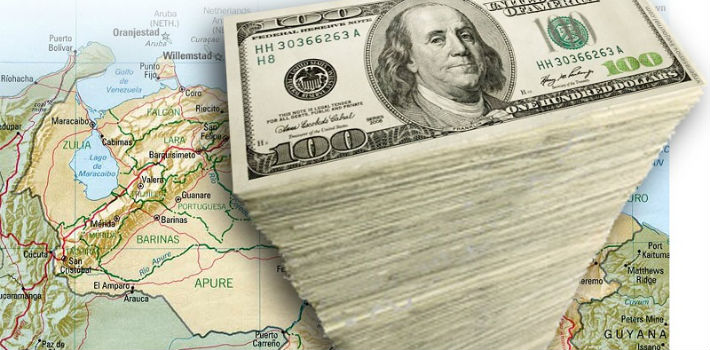
Español“The principal opponents of dollarization are governments: they don’t like it, because they lose power,” Miguel Dávila, former head of Ecuador’s Central Bank (BCE), told the PanAm Post.
He explained that the state “has the ability to print money and own the printing machines when the currency isn’t the dollar,” and as such it’s “obvious” that they reject any moves towards adopting the dollar as their national currency.
Yet in the face of the wide-ranging economic crisis gripping Venezuela, dollarization proponents increasingly point to the experience of Ecuador, where the dollar as been the official currency since 2000.
The switch came after an economic crisis in the Andean country which saw inflation reach 60 percent, and currency devaluation of some 300 percent. Ecuador first established an “informal dollarization” in the country: people could change sucres for the greenback in order to keep their savings, and the majority of prices for goods were calculated in dollars.
The former BCE chief argued that Venezuela is facing a “very similar” situation to Ecuador at the turn of the millennium. A significant fiscal deficit, a marked depreciation in the bolívar, and uncontrolled inflation are all symptoms which Dávila says the adoption of the US currency could ameliorate.
“It’s possible for Venezuela to install the dollar as the official currency,” he said, arguing that once exchange controls cease to be a problem and devaluation is eliminated, the economy will be able to focus on boosting production.
He added that the stability that dollarization brings with it would create a long-term market favorable to citizens investing in the goods that they need.
“Genuine dollarization gives the best basis possible for solving economic problems, but it requires government will,” he clarified.
Venezuela, by contrast, is currently close to an “informal dollarization” as the government prioritizes importers of basic goods for receiving valuable foreign reserves, causing one sector of the economy to run on dollars at the expense of others.
As a result, only a lucky few are able to “dollarize,” while the most vulnerable sector of the population suffers the consequences. “I believe that Venezuela, motivated by the scarcity of dollars, is heading for the worst of all worlds,” Dávila warned.
With Dollarization, Governments Lose Power
Venezuelan economic policy institute Cedice held a forum last week in the capital, and another in the interior of the country, to promote the “democratization” of money through a possible substitution of the national currency for the US dollar.
The event was headed up by Ecuadorians Dora de Ampuero and Dávila, who both backed dollarization in Ecuador, as well as Venezuelan economist and management consultant Guillermo García, Caracas Chamber of Commerce Director Victor Maldonado, and José Luis Cordeiro, an economist and advisor during Ecuador’s transition to the dollar.
Cordeiro, also a member of Cedice, explained that prices of goods in Venezuela such as houses, air fares, and cars, are already calculated using dollar prices as a base, while citizens’ salaries are valued in bolívares.

According to the specialist, this situation causes distortions, while unifying the currency in exchange for the dollar would eliminate such price discrepancies.
Cordeiro added that “currently no one wants bolívares, not even the government.” Venezuelans know that the bolívar is increasingly losing its value, and are seeking to “buy foreign currency” as a means of protecting their money, he explained.
Maldonado meanwhile told the PanAm Post that the bolívar “doesn’t guarantee savings, stability, nor investment or flow of capital.” As a result, he suggested, Venezuela has come to a point where the only remaining option is to switch to the dollar.
García also backed dollarization, telling the PanAm Post that it would be “a solution to devaluation and a great stabilizer of the macro-economic situation.”
He added that once the dollar were established as the official currency, Venezuelans’ purchasing power would dramatically increase. The management consultant explained that with dollarization the only way of increasing circulation is through investment or lowering taxes, rather than the Central Bank printing worthless notes.
As a result, the government would be forced to increase national production to boost imports and reduce exports.
Maldonado similarly emphasized that the “printing of notes without support is a genuine machine for making poverty” in Venezuela, arguing that dollarization would eliminate the practice by the Central Bank and loosen the government’s stranglehold over the management of money.
For the assembled economists, the benefits of changing currency far outweigh the costs: as Cordeiro noted, “with the US$250 billion that have been lost [since 1999], we could have dollarized Venezuela 30 times over.”
 Versión Español
Versión Español












